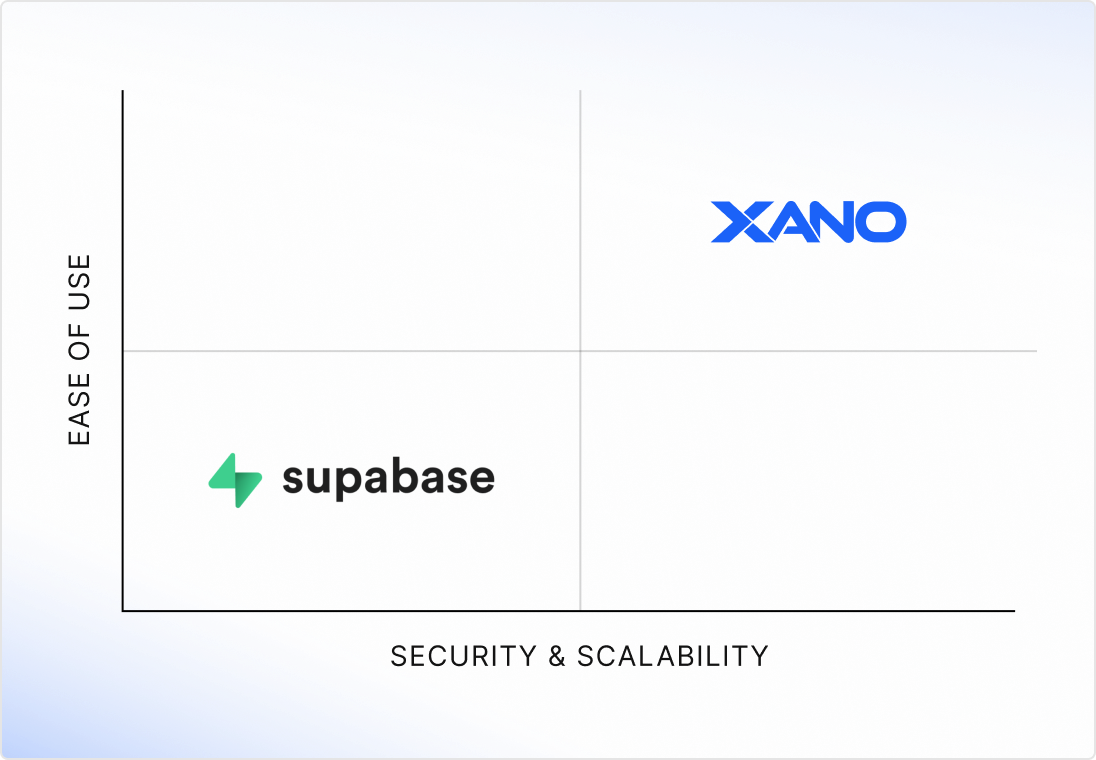Which is right for your project?
Xano vs. Supabase
Xano and Supabase are both impressive tools that increase development efficiency. Supabase is a database. Xano is a backend, including a scalable server, flexible database, and a no-code API builder. While Supabase is low-code and requires some coding, Xano offers true no-code and advanced business logic features.
Try Xano for free

When to Choose Xano
-> You want to implement complex business logic with visual development.
-> Your goal is to develop fast — without sacrificing flexibility or power.
-> You prefer built-in security and streamlined deployment.
-> You prefer personalized support and guidance.

When to Choose Supabase
-> You have the technical resources for traditional development approaches.
-> You have the bandwidth for custom code and handling implementation.
-> You prioritize direct control over your database.
-> You prefer open-source solutions with community support.

Why Build with Xano?
Ease of use
Xano requires no code, enabling anyone to build scalable, world-class software regardless of their development experience. Supabase requires code.
Xano is an all-in-one backend tool, so you don’t have to develop your server and custom APIs outside of the platform. Supabase only comes with a database and limited business logic functionality that requires coding. This means in many cases you have to use other platforms for business logic and server configuration.
Security & Scalability
Xano offers advanced scalability features and enterprise level certifications. This includes branching and merging so you can iteratively improve your application, NoSQL for large data sets, dedicated resources, and compliance with ISO 27001, and more.
Supabase does not offer these features, making it more difficult to scale and secure your app.
Compare
How Xano and Supabase compare on different factors
Comprehensive backend
Xano comes with a database, server, and API, while Supabase is primarily just a database.
Ease of use
Xano requires no code or development knowledge. Supabase requires code and development knowledge
Collaboration
Xano allows users to collaborate in real-time as they build out their business logic. It also supports no-code brancing and merging. Supabase does not offer these features.


Xano compared to Supabase

Benefits
No-code api builderFixed pricingLoad balancing and auto-scaleSimply put, Supabase is a real-time database, whereas Xano provides the entire backend. With Xano, not only do you get a flexible PostgreSQL database, but also, an easy-to-use no-code environment for creating complex business logic and a DevOps partner to scale your application.

Limitations
Coding knowledge requiredUsage-based pricingLimited scaling optionsSupabase is an open-source database, including features like authentication and storage. Although it provides some basic CRUD APIs, you will need to spin up more complex API endpoints, CRON jobs, and the rest of your business logic with code.














